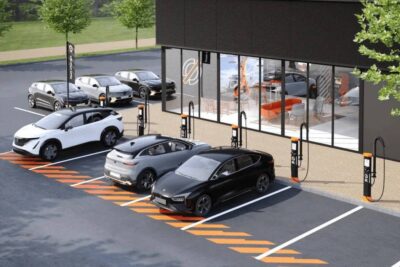
How CPOs can navigate industry challenges – An interview with Ampeco CEO Orlin Radev
Ampeco is based in Sofia, Bulgaria, and is active in more than 50 markets worldwide. Its largest customer base is still from Western Europe, but Ampeco’s white-label EV charging management software is also successful in the US. Last year, the company secured $13 million in a funding round led by BMW’s investment arm BMW i Ventures, saying it would use the money to grow its presence in the market. Ampeco says it currently has more than 120,000 charging points connected to its management platform.
“From the start, we set out to build a platform that can enable large-scale EV charging providers globally,” said Ampeco CEO Orlin Radev. “We never considered a specific market ‘local’ to us; instead, we made sure to adapt our platform to the specifics of key markets while learning and applying our learnings from our global coverage to bring value to EV charging providers in any market.”
Ampeco is also a platinum sponsor of the Intercharge Network Conference (icnc24), which is taking place on 2 and 3 September 2024 in Berlin. The event brings together the key players in the EV charging industry. electrive had the opportunity to speak to Radev ahead of the event about the challenges the industry faces – and its possibilities.
You will showcase your white-label solution at the icnc24 in Berlin in September. Why is this an important event for you?
The icnc24 in Berlin was one of the first EV charging events I attended after founding the company, and it’s become my favourite since then. The event brings together the entire ecosystem – our colleagues, partners, customers, and, yes, even some competitors. But what’s truly valuable is that we’re all united in working towards a future where EV charging is seamless, reliable, and accessible to all. It’s a perfect platform for us to showcase our white-label EV charging management solution and demonstrate how we manage the industry’s complex challenges. We hope to connect with potential partners, strengthen relationships with existing customers, and contribute to the industry dialogue on managing the complexity of EV charging at scale.
From your point of view, what are the top three challenges that CPOs face today? And are there differences between North America and Europe?
From our perspective, the top three challenges CPOs face today are reliability, profitability, and the complex regulatory landscape.
Reliability is a huge issue – we see statistics that only 68% of networks are reliable in Germany. In the US, we’re also seeing high rates of nonfunctional chargers. This challenge involves managing diverse hardware, ensuring seamless software integration, and providing rapid maintenance across wide geographic areas.
Profitability is another major hurdle. Many CPOs are struggling with large upfront costs, low margins on energy, and underutilization due to poor location selection or reliability issues. We’re seeing public companies in our space facing significant stock price pressures.
And finally, CPOs are juggling numerous regulations around payments, security, data, and EV charging infrastructure. These regulations vary across regions and constantly evolve, requiring CPOs to adapt their software, hardware, and business models continually.
You say that your software solution can help manage the complexity of EV charging. How does it do that, and what further steps are you looking to improve your product?
We now have vast experience working with EV charging providers in 50 markets across all use cases in EV charging – from residential to fleet and public charging. We build our product features to address the needs of our customers, and we now have one of the widest feature sets on the market. At the same time, our platform has been built from the start with scale, configurability and customization in mind, making sure it adapts to the specific use cases of each customer, but also enables further innovation – be it through integrations or custom developments.
Our powerful APIs allow EV charging providers to create unique value propositions without starting from scratch. They can seamlessly integrate their existing systems, develop custom interfaces, and implement new features that align with their specific business models. This flexibility enables our clients to address their unique challenges and capitalize on market opportunities swiftly.
With Ampeco, EV charging providers maintain full ownership and control over their operations, data, and business relationships. This level of autonomy, combined with our platform’s capabilities, allows our clients to navigate the complexities of the EV charging industry effectively. Looking ahead, we’re focused on further enhancing our platform’s extensibility, expanding our integrations, and refining our API to provide even more flexibility.
In the EV charging industry, there’s an ongoing debate about whether to build custom solutions or buy existing platforms. What key factors should CPOs consider when facing this “Build vs. Buy” decision?
First, they should evaluate how strategic EV charging is for their business. They should also assess the scale of their operations and their growth projections. Another crucial factor is the level of customization they require – do they need highly specific features that off-the-shelf solutions might not provide? Time-to-market is also critical; building from scratch can take significantly longer than implementing an existing solution. Lastly, they should consider long-term costs, including not just initial development but ongoing maintenance, updates, and scaling.
There is a so-called “hybrid approach” in EV charging software solutions. Can you explain how a CPO might leverage this strategy?
The hybrid approach in EV charging solutions, which we champion at Ampeco, combines the benefits of buying a robust, ready-to-use platform with the flexibility of building custom features on top of it. A CPO leveraging this strategy might start by implementing our Ampeco platform as their foundation. It gives them immediate access to essential functionalities and allows them to get to market quickly. Then, using our extensive API and custom app capabilities, they can develop unique features that differentiate their offering. For instance, they might create a custom mobile app that integrates with their existing customer loyalty program. This approach allows CPOs to focus their development efforts on their unique value propositions while relying on our platform for core functionalities. It offers the best of both worlds: the stability and reliability of a proven system, with the flexibility to innovate and customize.
You mentioned that reliability is one of the major issues that CPOs face. How does Ampeco ensure scalability for its clients while maintaining system reliability and performance?
Scalability is at the core of Ampeco’s design. Our flexible technical architecture accommodates enterprise-level scalability and extensibility. We use modern cloud technologies with auto-scaling capabilities to efficiently handle increased loads of chargers, users, and transactions.
We offer both shared and dedicated cloud infrastructure, coupled with comprehensive monitoring systems and optimized data storage. Our platform’s scalability extends to integration capabilities, with public APIs, webhooks, and Kafka integrations enabling seamless connections with existing systems. This ensures our platform adapts and scales as our clients’ businesses evolve, supporting their growth every step of the way.
How is Ampeco helping its clients adapt to new regulations, such as AFIR in Europe or various state-level requirements in the US?
At Ampeco, we’re proactively addressing evolving regulations like AFIR in Europe. Our platform offers comprehensive solutions to ensure compliance, including flexible tariff models, diverse payment methods, and detailed reporting. We support transparent pricing, ad-hoc payments via terminals, smart charging functionality, and real-time data provisioning as required by AFIR. Moreover, we were recently appointed to the EU Commission Sustainable Transport Forum, which takes care of the technical implementation of AFIR.
In the US, we’re adapting to state-specific requirements and federal programs like the National Electric Vehicle Infrastructure (NEVI) program. Our platform provides real-time monitoring, flexible pricing options, and easy access to necessary charging station data, enabling CPOs to meet local regulations effectively. AMPECO is also a part of the ChargeX consortium and helps shape statewide guidelines on improving charging uptime, incl. aspects like reliability and payment methods.
Apart from adapting our product to country-specific laws, Ampeco has recently launched a client-only regulatory database covering EV charging ecosystem aspects for all mature markets. We also offer regulatory advisory services at every step of our clients’ growth.
You recently partnered with Hubject. How will the agreement help you expand your business in Europe?
Our clients can now access Hubject’s intercharge and Plug&Charge networks through a single contract with Ampeco. Hubject’s extensive roaming network allows our clients to rapidly scale their operations across different markets, increasing their reach and potential customer base. As a certified Hubject Plug&Charge backend provider, we can offer seamless integration with any Plug&Charge-compliant hardware. This enhances the user experience for EV drivers, making our clients’ offerings more attractive. Ampeco and Hubject have proven track records in mature markets like Europe and emerging markets such as the US, South Korea, and the Middle East. This strategic alignment enables us to provide enhanced services tailored to the needs of large-scale EV charging providers, supporting their growth ambitions across various global markets.
What is the next step for Ampeco?
We [will] continue building the platform of choice for large-scale EV charging providers. We have some quite big networks to migrate to Ampeo in the next few months, and many more are evaluating us and discovering the immense benefits of having Ampeco at the heart of their software stack. So in the next couple of years, we expect to bring many of the biggest EV charging providers in Europe on the Ampeco platform while continuing to expand in other global markets.
We are also working on building a strong partnership ecosystem to create further value for our customers with even more out-of-the-box integrations, add-ons, and preferential terms with other vendors and providers.
Mr. Radev, thank you very much for the interview.





0 Comments